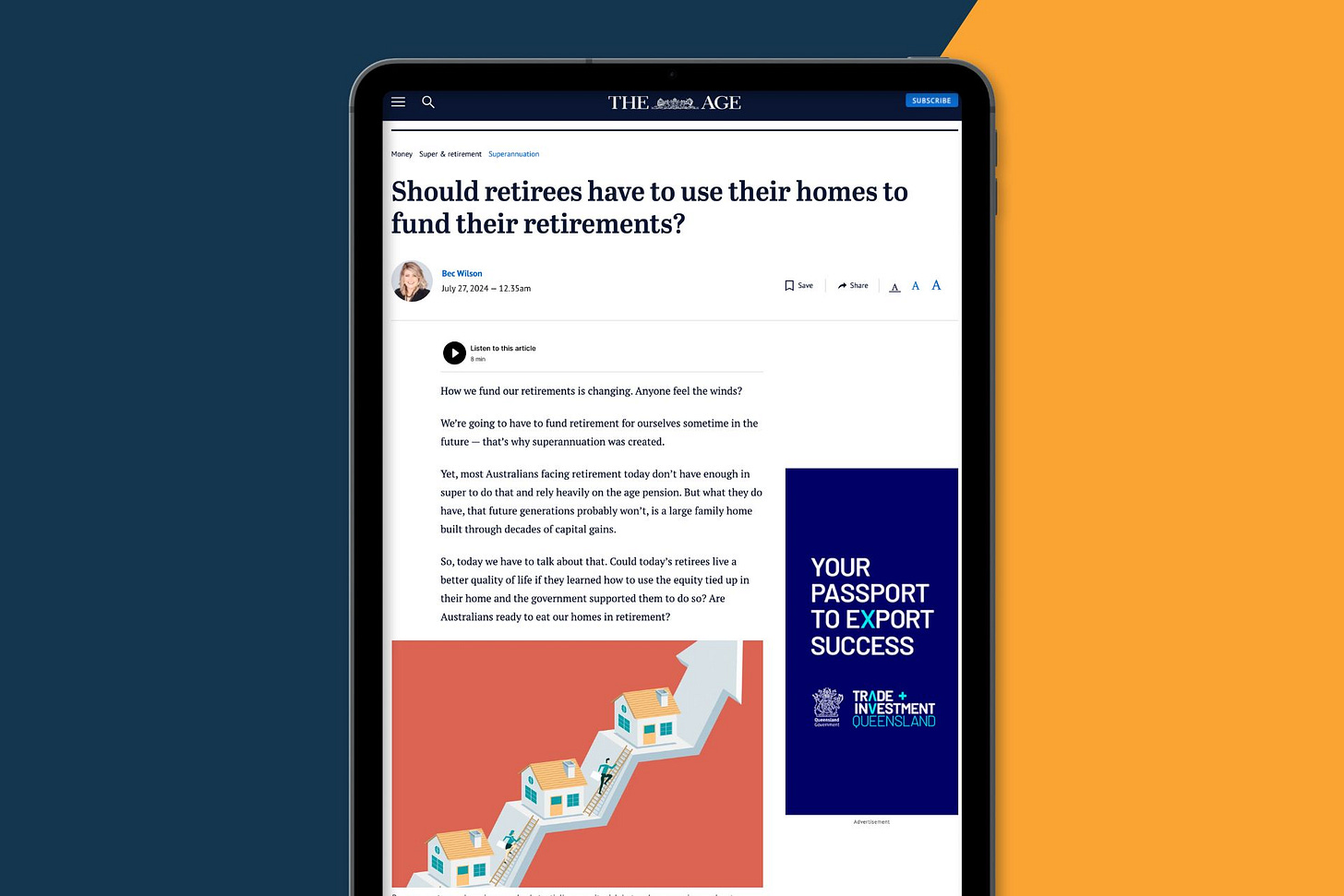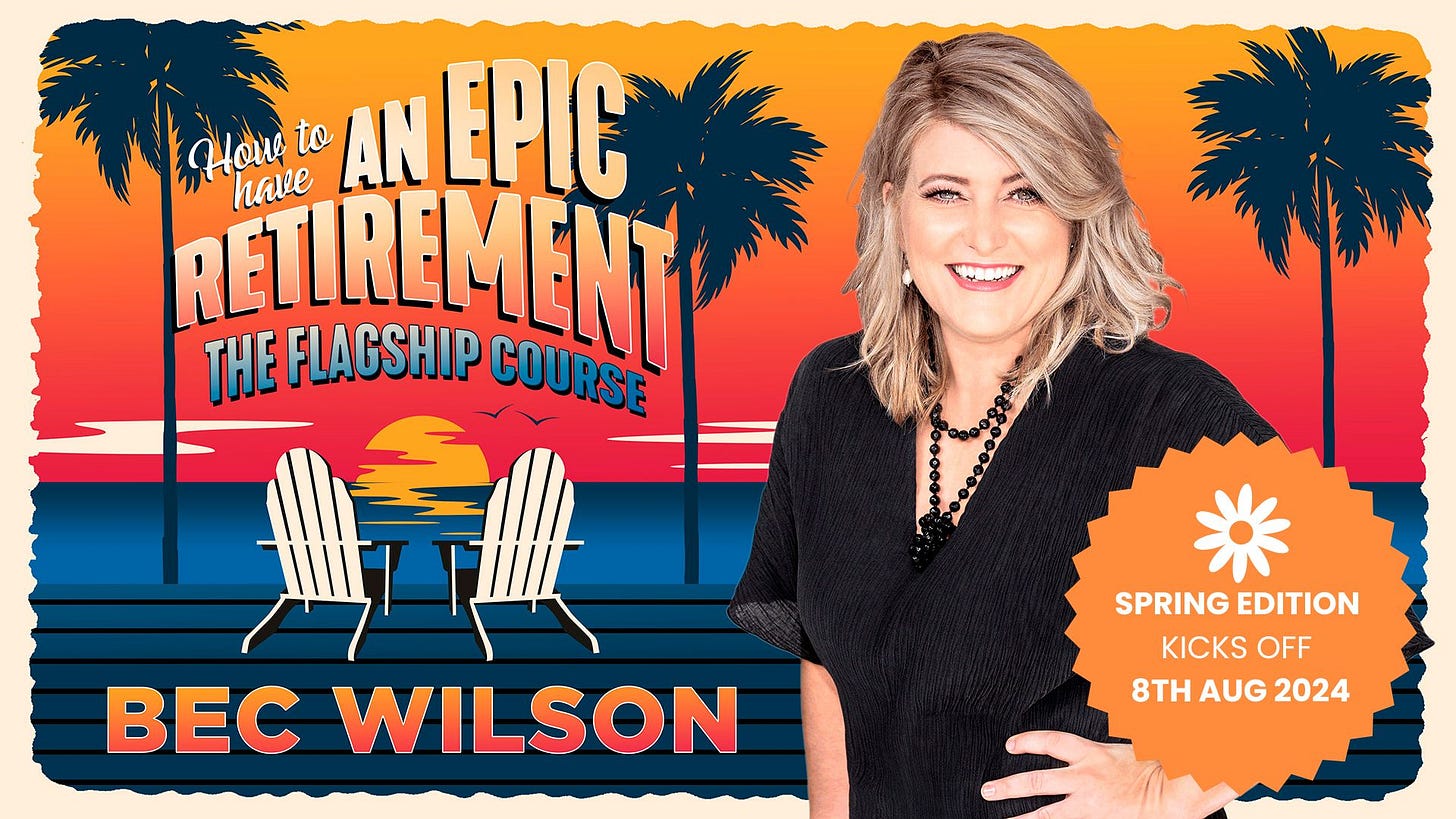I met a man who is afraid of retirement: finding joy beyond work
AND, in todays newspapers, "Should retirees have to use their homes to fund their retirement"
In this edition
Feature: How do you build your confidence?
SMH/The Age: Should retirees have to use their homes to fund their retirements?
From Bec’s Desk: Last days
Prime Time: New study reveals one specific type of exercise that can reduce dementia risk, improve cognitive power
I met a man who is afraid of retirement: finding joy beyond work
I spoke at a Sydney event this week for a swanky financial advice firm about how to have an epic retirement. My speech was basically an hour of talking about all the non-financial aspects of an epic retirement. Because, I assume, people with a financial adviser have the money stuff sorted.
Whenever I speak at an event that’s designed for pre-retirees and retirees, I like to spend my day chatting, drinking tea, and listening to how people are really grappling with their journey into retirement. During the event, a man I had met before came up to me and after we’d got through the small talk, he opened up. This very experienced, capable, and well-connected 62-year-old business leader, who you would presume has it all together, said to me quietly...
“Do you know, I’m really afraid of retirement. Like really afraid! And listening to you makes me kind of realise why. I have enough money, for sure. But I’d never thought about all that other stuff. I don’t actually have things I enjoy doing outside work. And I’ve never really taken much time to learn about retirement at all—so I’m just bloody afraid.”
Matthew’s a smart guy, with a good financial adviser. He’s planned for his future, financially. But as we continued talking, it became clear that his fear wasn’t about the money at all. It was about the unknowns—the shift in identity, the loss of routine, the challenge of finding new purposes and passions, the sense of belonging. He realised he hadn’t given much thought to how he’d fill his days or what would bring him joy and fulfillment once he stepped away from his career.
We chatted about where he gets his joy or hedonism from today, and he admitted, he couldn’t identify any pursuits or hobbies in his life that bring him joy, other than his work. And I challenged him to make that his first step. I wanted him to find things that bring him joy that are not work! I promised to check in in three months.
In my speech, I’d told the story of my own process of transition from being a CEO (and burning myself out), to writing the book and taking a more flexible and portfolio-based approach to working that better suited my own Prime Time and how I struggled with it at first. I talk about how I took a year of hedonism to try and work out things that I get joy from outside work - trying all sorts of new things to see what fit me and being very mindful of the small pleasures I’d not made time for in a long time. I planted and tended a new rose garden with a lot of care (googling all the problems that popped up and learning about them), booked to go to live music gigs with fervour, took up a selection of new exercise classes and activities - trying all sorts of crazy stuff including line dancing, zumba, pilates and so much more; reactivating my lunches with the girls and helping out young entrepreneurs via universities! I simply went looking for a year, for what I liked to do. And, it was a selfish, and rewarding project to choose me for a bit.
Whether you’re setting up for a more flexible and fitting life in your Prime Time, or are jumping straight to your Epic Retirement, it’s surely got to be about designing a life that excites and energizes you - or at the very least, starting to go looking for it.
As our conversation wrapped up, Matthew seemed more at ease. He had a spark in his eye, a newfound curiosity about what might bring him joy beyond work, and how he might be able to revisit his fear of retirement by looking beyond the spreadsheets and financial plans. He thanked me and said, “I’m going to start looking for things I enjoy, and planning for all the other stuff now. It’s time I look at retirement not just as the end of my career, but as the beginning of something new and exciting.”
Should retirees have to use their homes to fund their retirements?
Extract of article published in The Age, The Sydney Morning Herald, Brisbane Times, WA Today on Sunday 27th July 2024.
How we fund our retirements is changing. Anyone feel the winds?
We’re going to have to fund retirement for ourselves sometime in the future — that’s why superannuation was created.
Yet, most Australians facing retirement today don’t have enough in super to do that and rely heavily on the age pension. But what they do have, that future generations probably won’t, is a large family home built through decades of capital gains.
So, today we have to talk about that. Could today’s retirees live a better quality of life if they learned how to use the equity tied up in their home and the government supported them to do so? Are Australians ready to eat our homes in retirement?
A discussion paper released by the Actuaries Institute this week called out the problem directly, saying we need to change the narrative and the policies that support it, so it’s more acceptable for today’s retirees to access and spend part of the equity that has been built up in the home.
The paper also called for a cap, which would be very controversial, that could be set at something like $2.1 million on the value of the family home considered under the assets test for the age pension.
It also called for greater consumer protections on home equity release (or reverse mortgage) products, improved equity in the rental system for retirees to make renting more palatable, and addressing the financial disincentives to access part of the wealth stored in the home, like a cut to stamp duty for people over 55 who downsize.
But most importantly, the report’s author, Andrew Boal, partner in Deloitte’s Superannuation & Investment team, says we need to change the awareness among retirees of how they could use part of the value of their home as a financial asset.
I don’t disagree. And before you joist me for it — understanding it doesn’t mean you have to like it or follow through.
“An extra $250,000 released from their home would make a huge difference to many people, and that would still leave 70-80 per cent of their home’s value for other uses, like funding their aged care, managing unexpected retirement risks, and leaving a bequest to their children,” Boal said.
Most Australians in retirement, despite the affluent media rhetoric, are not living on millions of dollars, sitting by the beach, spending their kids’ inheritance. Quite the opposite. Most are living quite sensibly, some frugally, scrabbling together income from several sources to make ends meet, and finding clever ways to live a good life, if they can afford to.
Their income sources are limited, usually to a small superannuation fund, the age pension, and for some, an income stream from a rental property. Their superannuation balances aren’t large because most of their years of contributing to super were done at much lower percentages than today’s 11.5 per cent compulsory contribution rate.
And, alongside this struggle, 80 per cent of retirees own their homes outright, without a mortgage, and with decades of property price growth, that asset is valuable.
Most older people don’t see it as a financial asset or even an asset they want to contemplate using to make their standard of living better. Most see it as something they want to leave to their children in their will and, if they have to, use it to fund their aged care. And because our family home is exempt from the age pension assets test, no matter how much it’s worth, it has become a sacred cow.
But it doesn’t have to be like this. People can choose to downsize and free up capital for investing in income-generating assets that will fund an improvement to their lifestyle. They can also access some of the capital tied up in their home without selling it.
And the government could do more. What can people do now to access the equity tied up in their homes?
You can downsize and put money into superannuation tax-free
The government provides a generous downsizer concession to people who have owned their principal place of residence for more than 10 years and sell it to free up capital. You can contribute up to $300,000 per person ($600,000 per couple) from the proceeds of the sale into your superannuation, tax-free. This can then be invested and generate an income that can support your cost of living and lifestyle.
You can access an income stream, borrowing against the equity in your home
The government offers a powerful Home Equity Access Scheme, basically a reverse mortgage offered only as an income stream. They let you borrow against the equity in your home or other real estate you own in Australia.
The borrowed amount is paid as a fortnightly loan, either added to your existing age pension or as a standalone payment if you’re not receiving a pension. Interest is charged on the loan and compounds fortnightly. And the interest rate is 3.95 per cent, that’s more than 50 per cent below the commercial market for reverse mortgages.
You could draw a lump sum using a reverse mortgage or home equity
You could borrow against the equity in your home using a commercial reverse mortgage provider or home equity release company.
You need to be aware of the different offerings in the market and which ones are regulated properly. There are some pretty good safeguards in place from ASIC on debt products (like reverse mortgages etc.) that ensure limits on the amount you borrow and provide for your tenure in the home during your lifetime.
These differ from equity style solutions where a company takes a stake in your home, which are not as centrally regulated, falling only under real estate legislations.
And what could the government do to encourage us to use our homes more to fund our retirements? The Actuaries Institute paper has some good suggestions:
Read the rest of this article here on The Age, The Sydney Morning Herald, Brisbane Times, WA Today. It also appears in the print editions today.
Course 25% off deal closes tomorrow
The Early Bird 25% off deal for the next How to Have an Epic Retirement Flagship Course is closing on Monday 29th July at 12 noon. The course kicks off on the 8th August 2024.
You can download a brochure here, with very detailed information about the speakers, dates for all our live Q&As and the content that we cover.
Or, just book your place here.
There’s so much included in the program:
6 weeks of on-demand lessons (14 modules, delivered in 100 short, punchy video lessons)
6 live Q&As with some of Australia’s most respected retirement experts
1 live group coaching session on finding your sense of purpose
A 150 page workbook, professionally produced
A copy of How to Have an Epic Retirement, signed by Bec.
Our Epic Retirement Excel Budget Template and lessons on how to use it
This week marked the 1st birthday of my little book that could… How to Have an Epic Retirement, which was released on the 26th July 2023. It’s one year old, and I’m thrilled to say that there’s tens of thousands of copies floating around Australia, helping retirees navigate modern retirement. And it’s still going strong. It’s the #2 bestselling self help book by an Australian Author and the #1 bestselling retirement book, based on live, book sales data. It’s also sitting almost perpetually in the Amazon top 100 books. But this week something really cool happened…
Big W have this week put the book onto their backlist, and have ordered heaps of new stock, and are going to carry it in stock in all their stores and online (it had been out of stock for a few months in Big W stores). So, from today, you can order your copy online from Big W's website here: BUY ON BIG W HERE.
Or, simply pop into a store, any Big W store - all over Australia.
”What is a backlist?” I hear you asking.
It's exciting to be put on the backlist. Normally a book, after its first six to twelve months fades out of bookstores as new books take over. A backlist is a list of books that stores want to hold in stock at all times.
Aside from that, there’s plenty of things going on. First a big thanks to the team at Wattle Partners for including me in their event lineup in Sydney this week - great fun!
Second, I’ve booked, and started training for a Tasmanian three-day walk - the Three Capes Adventure Walk. I’m doing it in September, so the pressure is on! I’ve got a gym program, and a cardio program and I’m super excited to work towards this. Anyone done it already? Write to me - tell me what it was like! More on this in weeks to come.
And third, get your bookings in for the Epic Retirement Course - it truly is a great 6 week program and I can’t wait for the next one. Books go out in the mail early this week, and the earlybird deal ends Monday!
Have a great week ahead. You can always email me at bec@epicretirement.com.au. Until next week… make it epic!
Many thanks! Bec Wilson
Author, podcaster, guest speaker, retirement educator … Visit my website for more info about me, here.
I couldn't be more excited about this week’s podcast. We all know that dementia is the second leading cause of death in Australia and is rapidly approaching the number one spot. And that most people in the second half of life start to worry about their cognition, knowing it is directly tied to our quality of life.
LISTEN TO THIS EPISODE OF THE PODCAST HERE:
In this episode, I chat with Dr. Daniel Blackmore, Research Fellow at the Queensland Brain Institute and one of the leaders behind a groundbreaking new study released just two weeks ago. This study shows that a specific type of exercise—high-intensity interval training (HIIT) on a walking machine—can improve your brain’s cognitive function and reduce your risk of dementia for up to five years, after just a six-month burst of activity.
This research could fundamentally shift why we exercise in our Prime Time—from focusing on weight management and mobility to boosting our cognitive power.
Today, we dive into the science behind this discovery, and what we can all take away from the research and apply to our own lives - if we dare.














